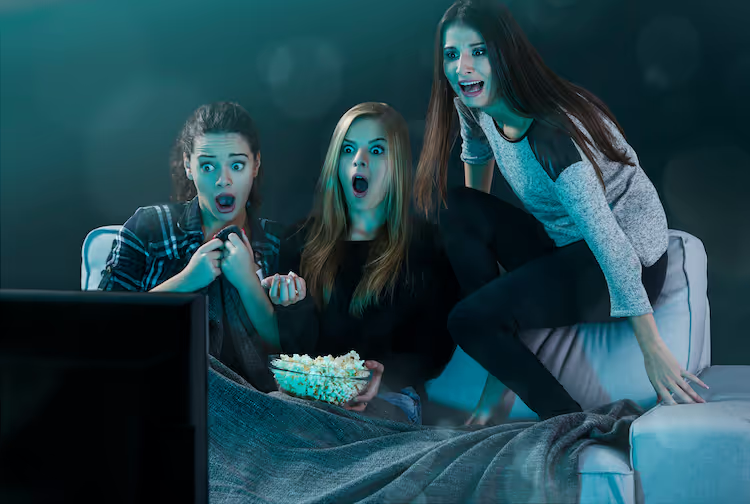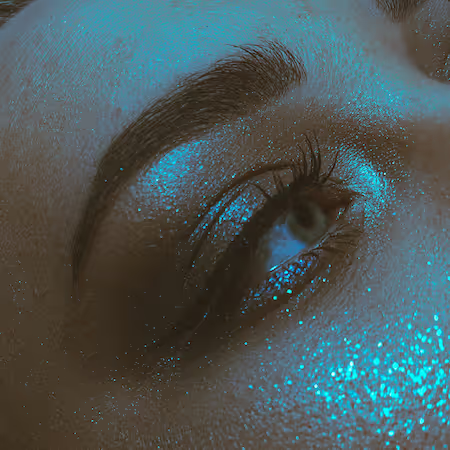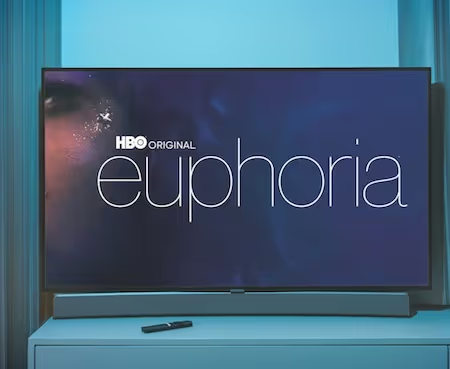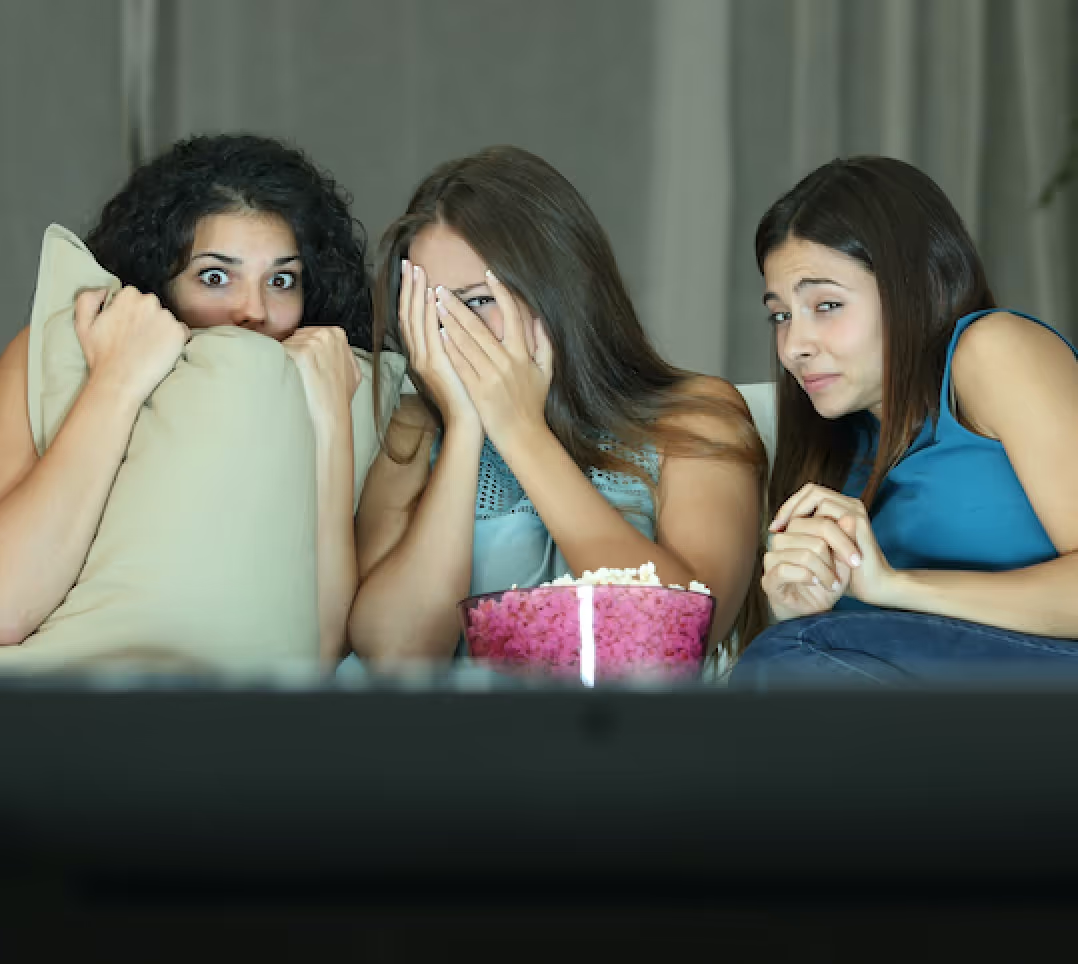


A little scary is fun, like a perfectly calibrated haunted house or Wizard of Oz’s creepy Wicked Witch and monkey scene.
Scary movies and shows abound. The level of darkness in current media is unbelievable, with the “brutality and hyper-violence” in Season 4 of Stranger Things or the massively successful and highly controversial Netflix series, Monster: The Jeffrey Dahmer Story about a serial killer.
I have been thinking about ways to talk with kids about horror in movies, TV shows, and online in general, and these are some ideas:
I vividly recall when my son was 13, and he confided in me that he and some friends had watched a horror movie at someone’s house. He found some scenes so vile that he was still shaken by the film several days later. He talked about having all of those disturbing images reoccurring in his head and how he regretted watching it in the first place.
I asked him if he wanted to tell me about the disturbing things. After a little pause, he started talking about them. It took work to stay calm while hearing about some really gross details. I felt disgusted but didn’t let it show. I could see he was relieved after talking to me about how scary the movie was.
Many young people and adults love horror films and tell me they don’t feel any lingering trepidation or repulsion after watching such content. Instead, they talk about how they love the feeling of being scared. That adrenaline rush of the build-up. The intense scenes that follow. They say, “No problem, bring it on.”
Learn more about showing our movies in your school or community!
Join Screenagers filmmaker Delaney Ruston MD for our latest Podcast

Learn more about our Screen-Free Sleep campaign at the website!
Our movie made for parents and educators of younger kids
Learn more about showing our movies in your school or community!
Wow, so very different from me. I am not at all a fan, but I must confess that this weekend, I watched the trailer for Megan, an upcoming movie, three times. In the movie, the little girl robot is mesmerizingly disturbing to watch.
Consider sharing this 3-minute short IMDB video with teens as a way to discuss the topic of horror films. The short features people on the street answering the question, “What Horror Movies Terrified You As A Kid?”
One young woman responds, “It was the Ring, I walked out of the movie, and then I literally slept with my mom for a good two weeks.”
Even though access to intense horror content is unimaginably simple, it does not mean that adults have to throw up their hands and give up on placing limits on this type of content. It doesn’t matter what our or our children’s opinions are on the price vs. the thrill of scary content. Having some limitations on content like this has many merits.
Learn more about showing our movies in your school or community!
Join Screenagers filmmaker Delaney Ruston MD for our latest Podcast

Learn more about our Screen-Free Sleep campaign at the website!
Our movie made for parents and educators of younger kids
Join Screenagers filmmaker Delaney Ruston MD for our latest Podcast
As we’re about to celebrate 10 years of Screenagers, we want to hear what’s been most helpful and what you’d like to see next.
Please click here to share your thoughts with us in our community survey. It only takes 5–10 minutes, and everyone who completes it will be entered to win one of five $50 Amazon vouchers.
A little scary is fun, like a perfectly calibrated haunted house or Wizard of Oz’s creepy Wicked Witch and monkey scene.
Scary movies and shows abound. The level of darkness in current media is unbelievable, with the “brutality and hyper-violence” in Season 4 of Stranger Things or the massively successful and highly controversial Netflix series, Monster: The Jeffrey Dahmer Story about a serial killer.
I have been thinking about ways to talk with kids about horror in movies, TV shows, and online in general, and these are some ideas:
I vividly recall when my son was 13, and he confided in me that he and some friends had watched a horror movie at someone’s house. He found some scenes so vile that he was still shaken by the film several days later. He talked about having all of those disturbing images reoccurring in his head and how he regretted watching it in the first place.
I asked him if he wanted to tell me about the disturbing things. After a little pause, he started talking about them. It took work to stay calm while hearing about some really gross details. I felt disgusted but didn’t let it show. I could see he was relieved after talking to me about how scary the movie was.
Many young people and adults love horror films and tell me they don’t feel any lingering trepidation or repulsion after watching such content. Instead, they talk about how they love the feeling of being scared. That adrenaline rush of the build-up. The intense scenes that follow. They say, “No problem, bring it on.”
Wow, so very different from me. I am not at all a fan, but I must confess that this weekend, I watched the trailer for Megan, an upcoming movie, three times. In the movie, the little girl robot is mesmerizingly disturbing to watch.
Consider sharing this 3-minute short IMDB video with teens as a way to discuss the topic of horror films. The short features people on the street answering the question, “What Horror Movies Terrified You As A Kid?”
One young woman responds, “It was the Ring, I walked out of the movie, and then I literally slept with my mom for a good two weeks.”
Even though access to intense horror content is unimaginably simple, it does not mean that adults have to throw up their hands and give up on placing limits on this type of content. It doesn’t matter what our or our children’s opinions are on the price vs. the thrill of scary content. Having some limitations on content like this has many merits.
Sign up here to receive the weekly Tech Talk Tuesdays newsletter from Screenagers filmmaker Delaney Ruston MD.
We respect your privacy.
A little scary is fun, like a perfectly calibrated haunted house or Wizard of Oz’s creepy Wicked Witch and monkey scene.
Scary movies and shows abound. The level of darkness in current media is unbelievable, with the “brutality and hyper-violence” in Season 4 of Stranger Things or the massively successful and highly controversial Netflix series, Monster: The Jeffrey Dahmer Story about a serial killer.
I have been thinking about ways to talk with kids about horror in movies, TV shows, and online in general, and these are some ideas:
I vividly recall when my son was 13, and he confided in me that he and some friends had watched a horror movie at someone’s house. He found some scenes so vile that he was still shaken by the film several days later. He talked about having all of those disturbing images reoccurring in his head and how he regretted watching it in the first place.
I asked him if he wanted to tell me about the disturbing things. After a little pause, he started talking about them. It took work to stay calm while hearing about some really gross details. I felt disgusted but didn’t let it show. I could see he was relieved after talking to me about how scary the movie was.
Many young people and adults love horror films and tell me they don’t feel any lingering trepidation or repulsion after watching such content. Instead, they talk about how they love the feeling of being scared. That adrenaline rush of the build-up. The intense scenes that follow. They say, “No problem, bring it on.”

The Screenagers’ Tech Talk Tuesday blog from two weeks ago provided four questions for teens to answer regarding the HBO show Euphoria. As intended, the questions sparked conversations among adults and teens, and we got many thoughtful answers from teens in the questionnaire.
READ MORE >
I find HBO’s Euphoria incredibly disturbing and know that although so many of our kids have watched it, many parents never have. Today, I offer a way into a conversation with youth about the show’s topics and popularity.
READ MORE >
The intensity of gore and shockingly disturbing violence in popular shows and our kids are often freaked out by gore, but they become increasingly accustomed to it with age. For many teens, it can be quite appealing. So today, I’m interested in looking at where we are at this moment in time when it comes to violence in shows.
READ MORE >for more like this, DR. DELANEY RUSTON'S NEW BOOK, PARENTING IN THE SCREEN AGE, IS THE DEFINITIVE GUIDE FOR TODAY’S PARENTS. WITH INSIGHTS ON SCREEN TIME FROM RESEARCHERS, INPUT FROM KIDS & TEENS, THIS BOOK IS PACKED WITH SOLUTIONS FOR HOW TO START AND SUSTAIN PRODUCTIVE FAMILY TALKS ABOUT TECHNOLOGY AND IT’S IMPACT ON OUR MENTAL WELLBEING.
